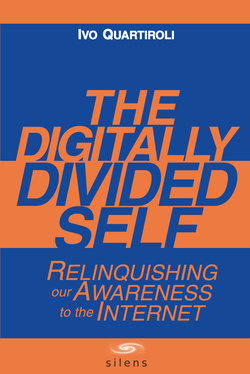Читать книгу The Digitally Divided Self: Relinquishing our Awareness to the Internet - Ivo Ph.D. Quartiroli - Страница 19
На сайте Литреса книга снята с продажи.
Chapter 2 “It’s Only a Tool”
ОглавлениеIf there were a law stating that “people should stay in front of a screen for most of their waking time, both indoors and out, avoiding real-life meetings as much as possible, shop without touching or seeing the product, find their soulmates through Internet announcements, consume an average of 34 gigabytes of information daily” (University of California, 2009), there would be a revolution. But if it’s seen as our “freedom,” then it’s fine. Technology can do this because it acts on a higher level than laws, rules or impositions. As Neil Postman (1993) wrote, “Technology imperiously commandeers our most important terminology. It redefines ‘freedom’ ‘truth,’ ‘intelligence,’ ‘fact,’ ‘wisdom,’ ‘memory,’ ‘history’ – all the words we live by” (p. 8). Facebook now has even transformed the meaning of “friend” and “like.”
For most of us, technology acts deeply in moving awareness away from the connection with our inner world – powerfully redefining both our inner and outer life. Sustained attention, awareness and introspection—the qualities needed to break out of the automated mind – become especially difficult when we are drowning in information, mostly brief and directed to the latest news.
Joseph Weizenbaum (1976), exploring the character of compulsive programmers as early as 1976, found them disinterested in their bodily needs and detached from the world around them. We are not surprised to meet such figures in countries where advanced technologies are part of everyday life.
Cubans I met traveling there in 2000 were usually lively people, with direct personal contact, sensual, relating to immediate reality. It was striking to see two computer technicians, on the contrary, detached, immersed in their own worlds, neglecting themselves, communicating with few words. I realized how daily contact with a tool – in this case computers and programming (tools which had been available there for only a few years) – can have a stronger impact on social attitude and personality than the collective conditioning of society.
There is probably a mutual feedback between personality and life choices, but without doubt technology also shapes psyches. Even early in history, Taoists observed that the use of instruments carries the risk of becoming mechanical ourself. Today – from Hong Kong to Brazil, from Lithuania to South Africa, from Egypt to New Zealand – wherever people use the Internet, they click on the same icons, use the same shortcuts in email and chats, connect with people through the same Facebook modalities. This is the globalization of mind.
